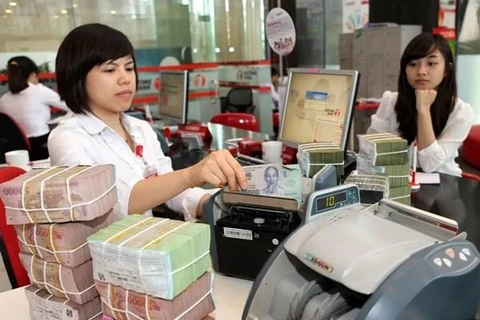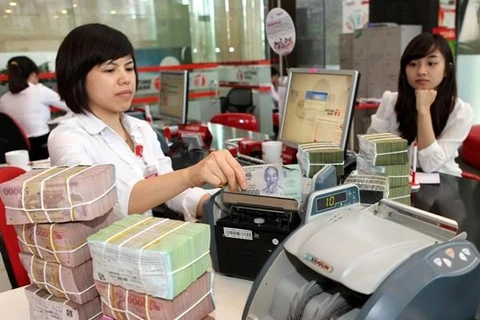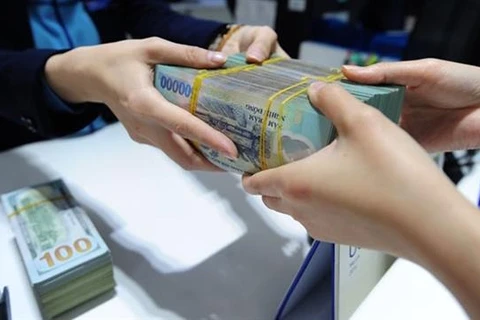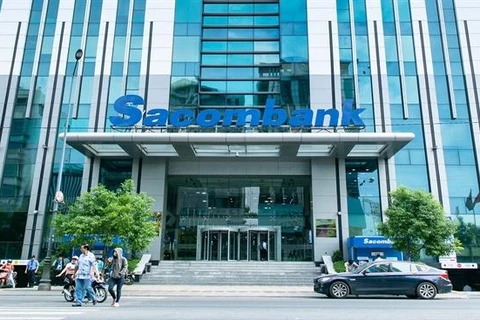Hanoi (VNA) – Nearly 9.6 trillion VND (417.3 million USD) worth of bad debts were handled each month from August 15, 2017 to August 31, 2019, or 4.7 trillion VND higher than that during the 2012 – 2017 period.
Deputy chief inspector of the Banking Supervision Agency under the State Bank of Vietnam (SBV) Nguyen Trong Du told a teleconference on October 15 to review the two-year implementation of the National Assembly’s Resolution No.42/2017/QH14 on pilot settlement of bad debts by credit organisations and the Prime Minister’s Decision No.1058/QD-TTg approving the project on restructuring credit organisations associated with the settlement of bad debts for the 2016 – 2020 period.
Du said as of August 31, 2019, the rate of bad debts of the credit organisations system was 1.98 percent.
From August 15, 2017 to August 31, 2019, the sector dealt with 236.8 trillion VND of bad debts in accordance with Resolution No.42.
He said the SBV will continue fine-tuning the legal framework on monetary and banking activities, governance and risk management regulations in the near future.
The sector will also restructure weak non-bank credit organisations and work closely with ministries and agencies on the effort, he added.
SBV Deputy Governor Nguyen Kim Anh said financial capacity of credit organisations has been strengthened with increasing chartered capital and transparency over the past two years, thus contributing to reducing bad debts.
Speaking at the event, Deputy Prime Minister Vuong Dinh Hue said the SBV set the goal of cutting bad debts to 5 percent this year, and 3 percent next year, which is completely reachable.
He asked banks to take the initiative in the process of restructuring and dealing with bad debts, in line with law while sharing difficulties with businesses.
They must take measures to increase chartered capital in order to ensure supply to the economy, closely control bond issuance, and improve credit quality.
The leader suggested the SBV build a bad debt settlement scheme for poor and loss-making State projects and work with the Finance Ministry to submit a plan to the government to raise capital for State commercial banks.
He affirmed that the settlement and restructuring of bad debts is also the responsibility of the entire political system, from the central to local level./.
Deputy chief inspector of the Banking Supervision Agency under the State Bank of Vietnam (SBV) Nguyen Trong Du told a teleconference on October 15 to review the two-year implementation of the National Assembly’s Resolution No.42/2017/QH14 on pilot settlement of bad debts by credit organisations and the Prime Minister’s Decision No.1058/QD-TTg approving the project on restructuring credit organisations associated with the settlement of bad debts for the 2016 – 2020 period.
Du said as of August 31, 2019, the rate of bad debts of the credit organisations system was 1.98 percent.
From August 15, 2017 to August 31, 2019, the sector dealt with 236.8 trillion VND of bad debts in accordance with Resolution No.42.
He said the SBV will continue fine-tuning the legal framework on monetary and banking activities, governance and risk management regulations in the near future.
The sector will also restructure weak non-bank credit organisations and work closely with ministries and agencies on the effort, he added.
SBV Deputy Governor Nguyen Kim Anh said financial capacity of credit organisations has been strengthened with increasing chartered capital and transparency over the past two years, thus contributing to reducing bad debts.
Speaking at the event, Deputy Prime Minister Vuong Dinh Hue said the SBV set the goal of cutting bad debts to 5 percent this year, and 3 percent next year, which is completely reachable.
He asked banks to take the initiative in the process of restructuring and dealing with bad debts, in line with law while sharing difficulties with businesses.
They must take measures to increase chartered capital in order to ensure supply to the economy, closely control bond issuance, and improve credit quality.
The leader suggested the SBV build a bad debt settlement scheme for poor and loss-making State projects and work with the Finance Ministry to submit a plan to the government to raise capital for State commercial banks.
He affirmed that the settlement and restructuring of bad debts is also the responsibility of the entire political system, from the central to local level./.
VNA
























